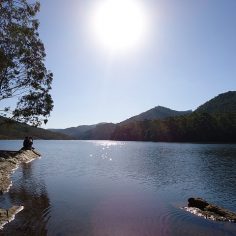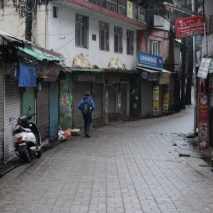
Sandra Arnold is an award-winning writer, originally from the UK, who lives in New Zealand. She has a PhD in Creative Writing from Central Queensland University, Australia and has published two novels and a book on parental bereavement. Her work appears in numerous international journals and anthologies including Flash: the International Short-Short Story Magazine, Blue Five Notebook, New Flash Fiction Review, Spelk, Bending Genres, Fictive Dream and Bonsai: Best Small Stories from Aotearoa New Zealand (Canterbury University Press, NZ, 2018). She was nominated for the 2018 Pushcart Prize and the 2017 and 2018 Best Small Fictions. In 2019 her third novel Ash will be published by Mākaro Press (NZ) and her first flash fiction collection Soul Etchings by Retreat West Books (UK). She is on the advisory board and is a guest editor for Meniscus: The Australasian Association of Writing Programmes.



Just an old grey Volkswagen
Sandra Arnold
“My father has a little store in Amazonas,” Bernado says. “He sells bread, guarana, rice and beans. When I phoned him to tell him I’d passed my exams to go to university he had a party to celebrate.” He grins from ear to ear. “So now I can work, I can study and I have already bought a small piece of land.” He springs off the sofa and over to the window. We follow the direction of his outstretched arm over the spire of the little blue church that looks so much like a music box that if I could lift off the roof I feel sure I would see the priest and congregation spinning in small circles underneath. Bernado is pointing over the traffic-clogged streets of the city, past the high-rise office blocks and apartment buildings, to the shacks of the outer suburbs. He takes a deep breath. “I have put a deposit on my land and I pay it off every month. In five years it will be mine and on my land I will build my house. Then I will buy a nice car and a computer.”
“But what will you do for money, now you’ve lost your job?” I ask.
He shrugs, “I’ve started teaching English at a high school near where I live. It’s not as much as I was getting here, as a receptionist, because I have just three times a week teaching, but they might give me some more classes soon. And I sell popcorns in the street.”
Beth says, “I think it really sucks that they sacked you. None of the other receptionists can speak English. When they see us coming it’s like, hey, we’re all suddenly very busy!”
“Well, soon you will be able to speak Portuguese,” he grins, “Then you won’t have those problems no more. But, speaking of English, I would like to invite you to my school to meet my students. I’ve told them all about you and they want to practise their English with you. They are very excited that there are some foreigners here in our city. Will you come to meet them? I could pick you up in my car at 6.30.”
Just an old grey Volkswagen – Sandra Arnold 2
The sky turns from black to pearly grey as we wait on the pink marble wall outside the apartment building. Aromas of fresh bread drift on the warm air. Further down the street the man from the bread shop emerges to begin his daily ritual of hosing down the pavement. He directs a jet of water onto piles of plastic cups and cigarette butts and washes them away from his patch to the gutter in front of the shop next door.
A sound like thousands of metal chips grinding inside a giant concrete mixer indicates the first buses are coming into the square to collect the early commuters. Three car alarms have begun wailing in the last ten minutes.
Beth, yawning widely, looks at her watch for the umpteenth time. “It’s quarter to seven. I could’ve been in bed all this time. He must have forgotten. I’m out of here!”
I’m about to follow her. I don’t want to be down here when the advertising trucks begin their rounds. With loudspeakers bigger than the rooms in our apartment those trucks bring a new dimension to the meaning of noise pollution. There’s no escape, but at least on the sixteenth floor we can close the windows.
Before Beth reaches the swing doors I see an old grey Volkswagen chug up to the building. I don’t know whether to feel relieved or sorry. Bernado sticks his head out the window, “Sorry I’m late. I had a small problem getting my car started!”
I have great difficulty controlling my smile at Beth’s expression as she trudges back, but she manages to erase the scowl from her face as she reaches the car. Bernado leaps out and opens the door to let us in. I settle into my seat. Immediately the back falls off. As I gasp in surprise Beth stifles a giggle and Bernado clicks his tongue in exasperation. “Sorry about that. It happens sometimes. But don’t worry. I have a piece of wood I will fix it with before the return journey.”
I look around for the seat belt and out of the corner of my eye see Beth in the back seat, convulsing with silent laughter. I’m grateful for her attempt at self-control, but there’s no seat belt and as we go over the first speed hump I lurch forward and grab the dashboard. It gives way under my hands then I see that it’s held together with several layers of sticky tape.
“Don’t worry about that,” Bernado reassures. “I’m driving very slowly so the dashboard will not fall apart. You know the roads here are so bad that it makes the dashboard to deform if I drive too fast. Also my steering wheel will come out because it is loose. But don’t worry,” he adds seeing my expression, “I am holding it in very carefully. I am going to spend some time fixing a few things about my car this weekend.”
Just an old grey Volkswagen – Sandra Arnold 3
We cruise up to a red traffic light and the car starts to roll backwards.
I hold onto the sides of my seat. “Brake, Bernado?”
He nods cheerfully. “I’m going to fix the brakes this weekend.”
A motorbike carrying two adults and three children overtakes us and goes straight through the lights. One of the children is carrying a goose under his arm. Three oncoming cars swerve and honk their horns. One of the swerving cars has a wardrobe on its roof. The driver and front passenger each have an arm out of the window holding onto the side of the wardrobe. Another man is standing on the back bumper also hanging on to the wardrobe. They wave and shout a greeting to the family on the motorbike who wave back.
“My God! They could have been killed!”
Bernado nods. “Yes. But if they are all killed together that’s better. It means there is nobody left to cry.”
I look at him to see if he is joking, but he isn’t smiling. His car has now rolled into the bus behind. He glances in his rear view mirror, but as there is a large crack right across it I doubt he can see anything.
“Unfortunately there are some very bad drivers in this city,” he says.”Most of them doesn’t have a licence” He glances at me and smiles shyly, “I got my license in the Amazon. Are you surprised to hear that?”
“Well …”
“Ha! You thought there were no roads in the Amazon. Right?” he grins in delight.
The lights change to green and his car slowly starts to crawl forward.
“Well, you might be even more surprised to know that I bought this car in the Amazon. When I came to live in this city I paid for my car to be brought here by truck”
The bus driver is honking impatiently and cars roar around us. One mounts the pavement to squeeze by and the pedestrians flatten themselves against the wall to allow it to pass.
Bernado swerves round the cars. “No problem,” he says as I dig my fingers into the dashboard. It crunches alarmingly under the sticky tape. “This is a one-way street. It’s a good short-cut.”
“I really think we should get back onto the proper road,” I say.
“We’re nearly there,” he says. “Just round the corner is the school.”
We pull up in front of a long, low building behind a peeling white wall covered in graffiti. I look for a handle on the door so I can open it, but there isn’t one.
Just an old grey Volkswagen – Sandra Arnold 4
“There is a secret to getting out of my car,” Bernado says, leaning across and pushing down the window. “Now, lean out the window and open the door from the outside.”
I stagger out and Bernado calls from the car. “I’ll be with you soon. I‘m just locking my car to stop thieves stealing it. I invented this special lock myself.”
Beth joins me on the pavement. She doesn’t look at me, but from the way her shoulders are shaking I know she’s on the point of bursting.
Bernado undoes a piece of wire that attaches the rusty gate to the gatepost and leads us into the small concrete schoolyard. Groups of teenagers are standing under an iron roof that extends from the main building. It’s their only shelter from the already blisteringly hot sun. They smile and greet us and stare at Beth. She ignores them. “This is a high school?” she whispers incredulously.
Two middle-aged women in jeans and T-shirts are arranging coffee cups and biscuits in the staff room. Bernado introduces them as the principal and deputy principal. They shake hands and welcome us warmly. While we sit on a worn leather sofa drinking thick, black coffee they ask Beth, in English, to tell them about her high school in New Zealand. Even her reluctant, lukewarm description is enough to make their eyes widen.
“You are so lucky,” the principal says. “But I suppose you already know that.” She gestures around the dingy room. “I know what you must be thinking. But this year I asked the government for money to upgrade all the buildings. We received only twenty five percent of what we asked for, so what can we do?”
She asks if we like living here.
I hesitate. “The people are very friendly.”
“And the city?” she pursues. “Did you know that its name means cow’s udder?”
“Good name,” murmurs Beth, ignoring my warning glance.
The principal looks pleased. “Yes, indeed. It’s another way of saying this is a land of milk and honey. We’re very proud of our city. Apart from the capital it’s the most developed city in Minas Gerais. Some people even say that in a few years it will be the capital instead of Belo Horizonte.”
After coffee Bernado leads us along the corridor into his classroom. The noise, like several hundred seagulls screaming on a rock, subsides as we enter, and about forty teenagers find their way back to their seats, beaming at us.
Just an old grey Volkswagen – Sandra Arnold 5
They have practised their questions in English.
“What is the population of New Zealand?”
“What is the weather like?”
“Do you like Brazilian food?”
“Are there only white people in New Zealand?”
As we answer they climb onto their desks to listen. Eventually they are all sitting on the front row of desks. One boy says to Beth, “You are very beautiful. Do you have a boyfriend?” The class erupts in delighted laughter.
Bernado grins, “I don’t get too strict with them. If I got strict I’m afraid they might not come to school, so I try to make it fun for them.”
At the end of our question and answer session the children swarm around us, wanting our autographs, asking us to return. The boy who asked Beth about boyfriends is sitting at the back of the class, drawing. He comes forward and presents his picture to her as a memento of the day. It’s a pencil sketch of an armadillo. She grins and thanks him in Portuguese. It’s the first time I’ve heard her speak Portuguese. The children are delighted and want her to say more, but Bernado manages to lead us out the door by promising the class that we’ll return.
“What did you think of them, Beth?” he asks, outside.
“How can they be that cheerful in such a dump?” she responds.
“They are happy because they have a school to go to,” Bernado says. “Many of our children doesn’t go to school.”
The return journey is not quite as hair-raising because, true to his word, Bernado has fixed the back of the front passenger seat with a piece of wood. I‘m careful, however, not to lean on it too heavily.
He comes into the apartment building with us because he wants to stay and chat to his friends at the reception desk. We say goodbye and hurry into the lift. Beth manages to control herself long enough for the lift door to close then she sinks to the floor, tears splashing down her face. In a few seconds I join her on the floor, laughing so hard I can’t breathe. The lift stops at the next floor and a man steps in, looks at each of us and hurriedly gets off at the next floor. I’m enormously embarrassed, but I can’t stop. We hold our stomachs and almost fall out at our floor, stumbling along the walls in the corridor and into our apartment. Beth throws herself spread-eagled on her bed and screams with laughter.
Just an old grey Volkswagen – Sandra Arnold 6
Twenty minutes later we are calm and sitting on the little balcony drinking pineapple juice. “Oh God mum, you should have seen your face when the back of the seat fell off, I thought I was going to die!”
“I can’t believe that car!” I say, shaking my head. “I can’t believe I let you stay in it. Why didn’t we just get out? Can you imagine either of us accepting a lift in a car like that in New Zealand?”
“Can you imagine a car like that even being allowed on the road in New Zealand” Beth says. “But in a city that’s named after a cow’s tit…”
I don’t want to laugh, but I can’t help it. “Well if he ever offers to take us anywhere again we’ll have to think of a polite excuse to refuse.”
The doorbell rings. When I open it Bernado is standing there with a shy smile on his face. “I want to give you a present for coming to my school today.”
“No, that isn’t necessary, Bernado,” I protest, a blush of shame creeping up my neck.
“But anyway I want you to have it,” he says and produces a package from behind his back and hands it to Beth. “It’s for you both.”
She unties the gold ribbon and unwraps the yellow tissue paper. Inside is a framed photograph of a truck laden with brand new cars. In the middle of them is the old Volkswagen.
“My car,” Bernado says. “In the truck that brought it from the Amazon. It’s my fourth car. And my best. The truck driver took this photograph for me. Now I want you to have my photograph. So you will always remember me. And this day.”